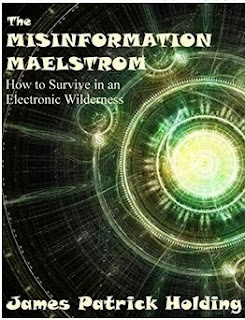The Misinformation Maelstrom
I like to tell people that I've been using databases that worked like Google since long before anyone knew what Google was. Back in the early 1990s, I was learning to use databases offered by a company named DIALOG (they're still around, but much changed) that functioned using the same basic Boolean search principles that are used today by effectively searchers.
The best and most effective way to do electronic searches has never changed. The problem is that most people still have no idea what the best and most effective way to do an electronic search is. Even worse, vendors like Google have encouraged poor use of electronic search tools with all kinds of silly gimmicks and games meant to please advertisers and cuddle up to ignorant users. The "Ask Jeeves" search engine (now just "Ask.com") was representative of one of the stupidest devices to ever be invented for online searches. It coddles users by encouraging them to perform searches in the form of a question. That's a good way to make people feel buddy-buddy with their computer, but it's a dumb way to do research.
I'm not just saying this; there are now a raft of authors who have written extensive works on how the Internet has made us stupider: Nicholas Carr, Andrew Keen, and Tom Nichols, to name a few. I won't say that I saw this coming back in the 1990s, but it wouldn't have been too hard to guess that it was ahead. I took a college course to learn how to search effectively. Simply because we have Google immediately available doesn't mean we're all experts at it.
My newest ebook, The Misinformation Maelstrom, is a collection of essays written mostly by me (with some portions by Nick Peters) that I have been working on and adding to since 2009. By that year, the epistemic disaster that has become the Internet was even more predictable, and I look back now and see that some of the comments I made in 2009 included forebodings of what is becoming more starkly clear in 2017. The issues here transcend our religious leanings; even you fundy atheists out there had better pay attention, because the latest "fake news" crisis is just one more example of how the Internet is making people stupider.
I'll round this off with a surprise: The kind of stupidity engendered by the Internet was known as long ago as the 1700s...and Thomas Paine, the fundy atheist idol, was a pioneering figure in the technique. Read it and find out how.
The best and most effective way to do electronic searches has never changed. The problem is that most people still have no idea what the best and most effective way to do an electronic search is. Even worse, vendors like Google have encouraged poor use of electronic search tools with all kinds of silly gimmicks and games meant to please advertisers and cuddle up to ignorant users. The "Ask Jeeves" search engine (now just "Ask.com") was representative of one of the stupidest devices to ever be invented for online searches. It coddles users by encouraging them to perform searches in the form of a question. That's a good way to make people feel buddy-buddy with their computer, but it's a dumb way to do research.
I'm not just saying this; there are now a raft of authors who have written extensive works on how the Internet has made us stupider: Nicholas Carr, Andrew Keen, and Tom Nichols, to name a few. I won't say that I saw this coming back in the 1990s, but it wouldn't have been too hard to guess that it was ahead. I took a college course to learn how to search effectively. Simply because we have Google immediately available doesn't mean we're all experts at it.
My newest ebook, The Misinformation Maelstrom, is a collection of essays written mostly by me (with some portions by Nick Peters) that I have been working on and adding to since 2009. By that year, the epistemic disaster that has become the Internet was even more predictable, and I look back now and see that some of the comments I made in 2009 included forebodings of what is becoming more starkly clear in 2017. The issues here transcend our religious leanings; even you fundy atheists out there had better pay attention, because the latest "fake news" crisis is just one more example of how the Internet is making people stupider.
I'll round this off with a surprise: The kind of stupidity engendered by the Internet was known as long ago as the 1700s...and Thomas Paine, the fundy atheist idol, was a pioneering figure in the technique. Read it and find out how.




Comments
Negations